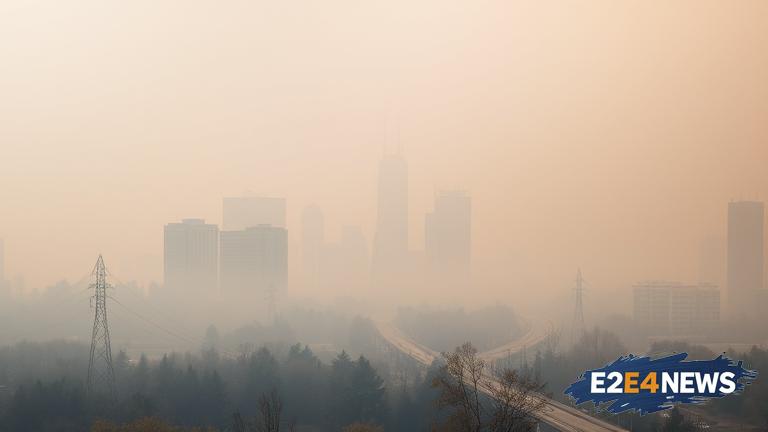A thick haze has descended upon Metro Detroit, as Canadian wildfires continue to burn out of control, releasing massive amounts of smoke and pollutants into the air. The air quality in the region has deteriorated significantly, with particulate matter levels exceeding safe limits. This has raised concerns among health experts, who warn that prolonged exposure to poor air quality can exacerbate respiratory issues, such as asthma and chronic obstructive pulmonary disease (COPD). The Michigan Department of Environment, Great Lakes, and Energy (EGLE) has issued an air quality alert, advising residents to take precautions to minimize their exposure to the polluted air. The alert warns that the air quality is expected to remain poor for the next few days, with high levels of particulate matter and ozone. The Canadian wildfires, which have been burning for weeks, have already forced thousands of people to evacuate their homes and have destroyed vast areas of land. The smoke from the fires has traveled south, affecting not only Metro Detroit but also other parts of the United States. The air quality in the region is being closely monitored by the EGLE, which is working with other agencies to mitigate the effects of the poor air quality. Residents are advised to stay indoors, especially during peak pollution hours, and to avoid strenuous outdoor activities. Those with pre-existing medical conditions, such as heart disease, are particularly vulnerable to the effects of poor air quality. The American Lung Association has also issued a statement, warning of the dangers of poor air quality and urging residents to take precautions. The organization notes that exposure to poor air quality can have serious health consequences, including increased risk of heart attacks, strokes, and lung cancer. The Metro Detroit area is not the only region affected by the Canadian wildfires, as other parts of the United States are also experiencing poor air quality. The National Weather Service has issued an air quality alert for several states, including Michigan, Ohio, and Indiana. The alert warns of high levels of particulate matter and ozone, which can cause respiratory issues and other health problems. The Canadian government has deployed firefighters and equipment to combat the wildfires, but the situation remains dire. The wildfires have already burned millions of acres of land, and the smoke from the fires is expected to continue affecting the air quality in the region for the next few days. In the meantime, residents are advised to stay informed about the air quality and to take necessary precautions to protect their health. The EGLE will continue to monitor the air quality and provide updates on the situation. The Michigan Department of Health and Human Services (MDHHS) is also working to educate residents about the risks of poor air quality and the steps they can take to protect their health. The MDHHS notes that children, older adults, and people with pre-existing medical conditions are particularly vulnerable to the effects of poor air quality. The department is urging residents to take precautions, such as staying indoors and avoiding strenuous outdoor activities, to minimize their exposure to the polluted air. The situation is being closely monitored, and residents are advised to stay tuned for updates on the air quality and any necessary precautions. The Canadian wildfires are a reminder of the importance of taking care of the environment and the need for continued efforts to prevent and mitigate the effects of wildfires. The air quality in Metro Detroit is expected to remain poor for the next few days, and residents are advised to take necessary precautions to protect their health.




